Dear Editor:
We have read the recent publication “Improved survival for older patients undergoing surgery for colorectal cancer between 2008 and 2011.” by Hamaker et al. (Int J Colorectal Dis.2014; 29: 1231–1236) with great interest. They reported that increasing utilization of laparoscopic approach ameliorates the survival rates of elderly patients with colorectal cancer. Thus, it is suggested that laparoscopic approach be used whenever possible. As mentioned in this study, laparoscopic surgical techniques can amend short-outcome of elderly patients to improve overall prognosis. Unfortunately, there was no information about postoperative complication to certify this causality in this research. A recent systematic review meta-analysis of 66,483 colorectal cancer patients found that elderly patients undergoing laparoscopic surgery had a decreased risk for cardiac complications, respiratory complications mortality and overall morbidity (Surg Endosc. 2014 Jul 2. [Epub ahead of print]). This might be a good evidence-based medicine proof of Hamaker’s results. We notice, furthermore, that the author had not included the patients undergoing emergency surgery to analysis. The United Kingdom National Bowel Cancer Project indicated that elderly people need more emergency surgery than do younger patients (Eur J Cancer. 2007; 43: 2285–2294). Under consideration that more relative contraindications (including intestinal obstruction and perforation) of laparoscopic surgery exist in emergencies, the rising rates of elderly patients and poorer prognosis in conventional surgery group will be observed if we bring the elderly patients undergoing emergency surgical procedures into research.
Probably as a result of eligibility criteria that specify performance status and comorbidity requirements, elderly patients are generally recruited to prospective randomized clinical trials less often than younger patients. For this reason, elderly patients are underrepresented in publications about colorectal cancer surgery approaches. This lack of data might lead surgeon to choose the conventional surgery just for the advanced age. As the clinical report described, only 8 % of elderly patients were subjected to colorectal surgery in the USA and 3 % in the UK are operated on by laparoscopy (Ann Surg. 2011; 253:508–514). To promote our understanding and change the “lagging” situation, additional clinical trials targeting the elderly patients undergoing laparoscopic surgery are desperately needed.
Sincerely,
Rui Wang • Mo-Jin Wang
Author information
Authors and Affiliations
Corresponding author
Rights and permissions
About this article
Cite this article
Wang, R., Wang, MJ. Laparoscopic surgery, a better approach for elderly patients with colorectal cancer. Int J Colorectal Dis 30, 719 (2015). https://doi.org/10.1007/s00384-014-2047-z
Accepted:
Published:
Issue Date:
DOI: https://doi.org/10.1007/s00384-014-2047-z

